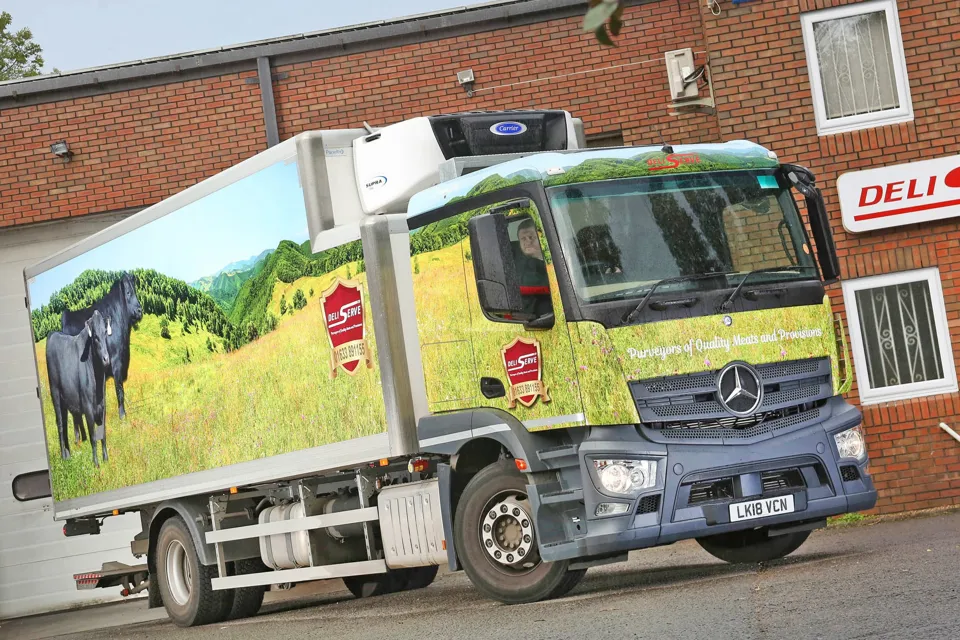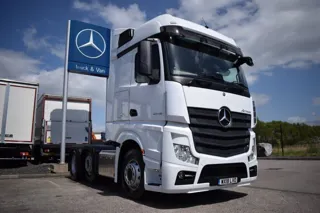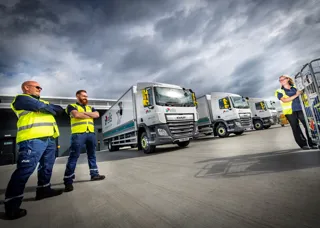Truck fleet operators distributing goods on behalf of third parties are increasingly seeking greater funding flexibility. Their own customers may be offering shorter contracts than they did in the past, with no guarantee of renewal, which makes commitment to a long-term finance deal more risky.
As a consequence, a fleet might be more inclined to sign up to a two-year deal than a four- or five-year one.
“If you enter into a five-year contract hire agreement, but the contract you have with your customer only covers a couple of years, then you have to work out what you are going to do with those vehicles once those two years are up,” says David Potter, managing director of Wolverhampton-based Asset Alliance Group.
The group operates across four sites and has 4,800 CVs out on contract hire to a wide variety of clients. It also runs a 400-plus rental fleet.
Simply sending vehicles back early is always an option, but can be financially painful. Not all manufacturers are prepared to include break clauses in the deals they offer.
The penalty levied is typically calculated as a percentage of the finance payments that would have been made had the agreement run its course, and could total thousands of pounds.
“If you sign up for three years, you’re on the hook for three years,” warns Peter Collins, MAN Financial Services director. MAN’s line-up includes the Volkswagen Crafter-based TGE van as well as trucks.
The penalty can be mitigated dependent on the circumstances.
If a fleet, for example, is returning a dozen 3.5-tonne vans because its pattern of business has changed, but it needs the same number of 7.5-tonne trucks instead and is happy to remain loyal to the leasing company concerned, then any penalty imposed is likely to shrink substantially.
“What can make a real difference is if the contract hire company is able to place the returned vehicles with another operator who is, in effect, able to take over the agreement, and keep making the payments,” says Neil Galloway, Renault Trucks Financial Services sales director. Renault Trucks markets the Master van alongside its truck range.
Even if their own customers are offering shorter contracts, many transport firms still favour longer contract hire deals – despite the risk of an expensive early termination – because the monthly instalments are lower, says Collins. “They want the cheapest rate they can get,” he adds.
They also calculate that if they lose a contract, then they will probably be able to replace it. Inertia and the work involved in switching from one transport company to another mean that some contracts remain in place for many years.
Longer agreements also have the advantage of allowing operators to predict a big chunk of their costs with some certainty – assuming the agreement does not have to be curtailed suddenly – for some time ahead. Statutory inspections, MOT tests and tyres can all be covered by the regular payments, as well as service and repair.
Short-term agreements sound as though they might be expensive, but much depends on how the residual value (RV) of the vehicle is viewed, suggests Potter. “There is an appetite in the used market at present for younger second-hand assets specified to a good standard and buyers will pay a premium for them,” he says.
Nailing down RVs over a longer period is, in fact, proving to be more of a challenge say some industry insiders given rising hostility towards diesels. More and more local authorities may take a tougher line over their admittance to city centres in future, with Oxford already planning an outright ban.
So, if lessors conclude that secondhand diesel CVs will be worth significantly less in a few years’ time than they are now, what implications will that have for operators’ costs? RVs help determine the size of the monthly contract hire payments fleets have to make.
There are ways to keep payments down, but they are likely to involve more expense for fleets somewhere along the line.
“It may, for example, be possible for the customer to put down a higher initial deposit, or make a balloon payment at the end,” says Dave Hickman, Scania Financial Services sales and marketing director.
The impact of tougher regulations on inner-city transport on diesel trucks should not be exaggerated though, given that many of them never go anywhere near city centres and residual values are fairly robust at present, adds Collins.
However, they could be affected if there is a significant downturn in the economy in three or four years’ time; and Brexit contains many unknowns.
Alternative fuels
So where does this leave the RVs of commercials powered by alternative fuels? Caution prevails, with some lessors wary of being too bullish about the second-hand value of anything propelled by compressed natural gas or liquefied natural gas because they view them as an interim step towards the more widespread adoption of battery-electric models, including hydrogen fuel cell.
They have reservations about battery-electrics too, which revolve around the question of how long the battery will last. If it is warranted for, say, four years, then offering a five-year deal could be problematic.
“We wouldn’t want to be responsible for the battery in its final year,” Potter comments.
Manufacturers are caught in a cleft stick. With operators as wary of gambling on the likely future value of electric trucks as the leasing companies are, they have to be prepared to underwrite the risk themselves if they are going to start selling them in volume.
The fact remains that a manufacturer has to stand by its products, says Collins. That is despite the fact that there are no hard and fast views on the residuals of vehicles powered by alternative fuels and no definitive matrix to act as a reference point.
One way of approaching this challenge as far as electric commercial vehicles are concerned, suggests Galloway, is to say that if a battery offering better performance and longer life appears, say, three years into a five-year agreement, then the existing battery will be removed, and the new one installed.
“Once that’s done, we’ll reschedule the instalments,” he says.
Won’t that mean the client ends up paying a lot more? Galloway doesn’t think so because the vehicle’s residuals should be enhanced.
“Payments could come down, stay as they are, or perhaps increase slightly,” he suggests. “It’s a bit of a leap of faith though.”
Hydrogen fuel cells represent even more of a leap of faith although many believe they are the only viable solution for long-haul trucks.
To boost their appeal, US-based hydrogen fuel cell truck pioneer Nikola – now engaged in a joint venture with Iveco – is offering vehicles under a seven-year/700,000-mile leasing agreement in its home market.
The deal includes maintenance and fuel as well as the truck itself. It is possible that the fuel cell Nikola Tre – to be marketed through Iveco dealerships, and due to be in service with operators in 2023 – will be supplied on this side of the Atlantic under a similar arrangement.
Onerous return conditions
Regardless of the method of propulsion selected, worries continue among truck fleets that they will be hit hard by onerous return conditions if they ink a contract hire deal. If they deal with Scania then their worries are groundless, insists Hickman.
“Our conditions are governed by our fair wear and tear guidelines and our vehicles are inspected by an independent third party assessor when they come back,” he says. It is the assessor rather than somebody from Scania who decides what is chargeable.
Steve Williams, sales manager at VFS Financial Services, the finance arm of Volvo Trucks, says: “We have a fair set of return conditions that are made clear to the customer from the start.”
Wear and tear in line with the truck’s age and the work it has been on is acceptable, but damage which should have been repaired – broken exterior mirrors and big dents in both the cab doors, for example – is not.
There are other penalties that can be levied.
“You may, of course, be penalised if you exceed the mileage agreed at the start of the agreement,” warns Galloway. A trend towards excess mileage should be picked up long before the lease expires and the agreement re-written accordingly.
“You can also switch trucks around from high-mileage to low-mileage work and vice versa, to equalise the mileage,” says Paccar Financial UK managing director, Steve Barfoot.
Like their truck counterparts, some light commercial operators are having to switch to shorter-term funding arrangements in line with the policies pursued by their own customers. Others are able to enjoy the stability of longer-term agreements dependent on the nature of the business they are engaged in.
Last year, Scottish plant hire specialist AB2K obtained 31 Mercedes-Benz Citan vans on a four-year full-service contract hire agreement with Fraikin. Based at sites in Aberdeen, Glasgow and Inverness, they are covering up to 30,000 miles annually.
AB2K was acquired by Quattro Group in 2018. Fraikin won the business on the back of supplying more than 150 vans to Quattro in 2017.
Formerly known as AB2000, AB2K used to buy its vans outright.
“Moving to contract hire allows us to take advantage of fixed monthly pricing, and knowing exactly how much we’re paying each month makes planning fleet replacement intervals a whole lot simpler,” says Jon Sherred, Quattro Group area manager.
A key reason behind the company’s decision to sign up with Fraikin is FraikinView.
It allows the operator to monitor the maintenance of its vans through a web portal. Areas covered include defect reports, service records and the speed with which breakdowns are handled.
Web portals of this type are especially important for O-licence holders.
Switching to a full-service contract hire agreement does not mean fleets can off-load all responsibility for ensuring their trucks are properly maintained to a third party. They need to keep a close eye on what is being done to their vehicles; blaming a third party workshop if brake defects and other faults are discovered in a roadside check will not impress the traffic commissioner.
That is something recognised by Newport, South Wales-based meat wholesaler Deliserve.
Fraikin supplies it with refrigerated vehicles from 3.5 tonnes upwards, including 7.5- and 18-tonners, under contract hire, and manages servicing and repairs. Deliserve uses FraikinView to monitor all scheduled and unscheduled maintenance work.
Major contract hire companies have engineering teams that may be able to come up with packages that can save operators cash.
Ryder has recently supplied Kuehne + Nagel (K+N) with 78 Mercedes-Benz Sprinter 314CDI 3.5-tonners equipped with refrigerated bodies built by Solomon. They are being used on a distribution contract the logistics group has with Costa Coffee.
As part of the deal, K+N is trialling Trailar solar technology sourced from Ryder.
Thin solar matting is applied to the body’s roof and connected to a smart charge controller which works in conjunction with the vehicle’s battery and alternator. The harvested energy contributes to powering the fridge’s fans as well as running the vehicle’s heating, air-conditioning, forward-facing cameras and other items of ancillary equipment.
Net result? Fuel consumption is down by around 7.8%, says Ryder.
 Ryder has also won a contract hire deal to supply 162 Dafs grossing at from 7.5-to-18 tonnes to Elis. They are mainly used to collect and deliver laundry, and Ryder engineers worked with Elis and bodybuilder Bevan to design improved restraining straps and mountings to secure the laundry cages while they are being transported.
Ryder has also won a contract hire deal to supply 162 Dafs grossing at from 7.5-to-18 tonnes to Elis. They are mainly used to collect and deliver laundry, and Ryder engineers worked with Elis and bodybuilder Bevan to design improved restraining straps and mountings to secure the laundry cages while they are being transported.
One option for fleets that do not want to be tied into a contract hire agreement is to choose a long-term rental deal that allows them to send vehicles back almost at a moment’s notice. However, such deals have their drawbacks .
While hire fleets are usually willing to provide long-term rental clients with vehicles with basic equipment such as amber warning beacons, and to allow them to apply their own livery, vehicles that are completely unique to the customer’s individual requirements can be far more problematic.
That is because it may be difficult for the rental fleet to hire them out again if they are sent back.
Demand for rental is increasing nevertheless, says Tim Bailey, fleet director at van hire giant Northgate, because businesses want increased flexibility.
Isn’t flexibility expensive?
“Commit to us for at least a year, and you will find the rental rate you pay is very comparable to the contract hire rate,” Bailey replies. Send back the vans you have hired after just three months and you will simply have to find the difference between the standard three-month rate and the discounted 12-month rate you were paying.
Of the 50,000 light commercials Northgate has on its books, just 60 are electric. More are sure to be added, but operators will have to come to terms with paying more to hire them, says Bailey, because they are so expensive to acquire.
Europcar Mobility Group commercial vehicle sales director, Stuart Russell, takes the same view. “So far as we are concerned, the rental rate is likely to be twice that of the equivalent diesel van,” he says.
The higher rate can, of course, be offset against the low cost of the electricity needed to power electric light commercials compared with the price of diesel.
“The demand for electric models isn’t really there at present though,” he adds.
Now with 8,000 light commercials up to 3.5 tonnes available to rent, Europcar saw its van hire business grow 40% last year, says Russell.
Partly this was driven by the uncertainty surrounding Brexit, but partly it was due to major changes taking place in the economy; the move towards online shopping and the widespread closure of traditional high street shops, for example.
“If things are uncertain, customers want the flexibility rental can offer,” he comments. “They want to increase and decrease the size of their fleets at the drop of a hat.”
He expects to see growth of around 23% this year.
Flexibility has its limits, however. If customers commit to a minimum three-month rental deal and send the vehicle back after just two months, then they will be charged for the entire rental period, says Russell.
“We’re quite clear about this in advance and the package rate we quote reflects this policy,” he says.
Moving up the weight scale, John Fletcher, Dawsongroup Truck and Trailer managing director, says truck hire remains quite buoyant.
“Rental trucks are increasingly becoming a core part of many fleets,” he adds.
Once again, as in the van market, the need for flexibility is helping to underpin demand. “Business is facing a shifting landscape,” he says.
Around 6,000 of the firm’s vehicles are available for rent while the balance are out on contract hire.
“The boundaries between long-term rental and contract hire have become increasingly blurred though,” Fletcher comments.
Some smaller transport fleets use hire purchase for some of their requirements. Interest in this option has been stimulated by the current availability of generous capital allowances.
Allowances of up to £1 million can be claimed against profits under a temporary arrangement introduced on January 1, 2019. It expires at the end of this year.
Modes of acquisition have altered little in their fundamentals over the decades. Could that change with the advent of new automotive technologies?
One option could be the introduction of pence-per-mile deals – something that has been suggested on a number of occasions over the years – perhaps based around a pool of vans and trucks that operators could draw on as and when needed.
“Pence-per-mile deals could work in the future as vehicles become more and more connected,” says Barfoot. “But the asset would still have to be funded while it was standing idle.”


















Login to comment
Comments
No comments have been made yet.